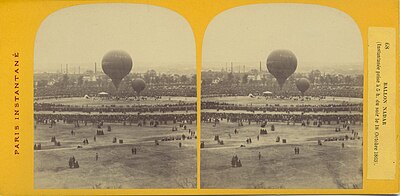The Philadelphia Balloon Riot occurred at Vauxhall Garden in Philadelphia, PA on the evening of September 8, 1819.[1] After guards beat a boy unconscious for attempting to climb a fence separating the paying guests from those who couldn't afford the expensive entry fee, crowds broke down the fence and ripped the hot air balloon to pieces.

Background
editBalloon aviation was a novel phenomenon in the U.S., the first manned flight in a U.S. balloon being accomplished by Edward Warren in Baltimore, MA in 1784.[2] In September 1819 the Franklin Gazette of Philadelphia announced that French aeronaut Monsieur Michel would perform a balloon ascension and parachute leap at Vauxhall Gardens.[1][2] Tens of thousands arrived to witness the balloon launch, but the one dollar admission (equal to $24.77 in 2024) fee prevented all but the wealthy from a closer look at the balloon.[3]
Given the nature of hot air balloon technology at the time, the success or failure of a given balloon flight was uncertain and suspenseful, as the process of inflation took an extended period of time.[4] Because of "insufficient gas," the balloon at Vauxhall Gardens did not rise and further annoyed the waiting crowd. Frustrated onlookers threw stones and punctured the balloon, whilst others attempted to climb the fence blocking the view.[2] One of these, a boy of fourteen, was beaten by guards for attempting to climb the fence. The sight of the boy, beaten unconscious, aroused the anger of the crowd.[2]
Causes
editThe exact causes of the Philadelphia Balloon Riot are uncertain. Paul Gilje considers the Philadelphia Balloon Riot to be an example of class conscious rioting, mainly caused by the visible divisions between those who could pay for better access to the balloon and those who could not.[3] Other scholars suggest that the overreaction of local authorities was an important factor in the riot, stressing the beating of the boy as the primary cause.[4] Still others ascribe the riot to a "dark side of popular enthusiasm."[2]
Events
editUpon seeing the bloodied body of the boy, the crowd took action. With the flagpole from the gardens as a makeshift battering ram, the crowd destroyed the gate.[2] They then, in a show of "egalitarian spirit," tore the balloon to pieces with "sticks and stones."[3] Not content with ripping the balloon apart, the crowd then smashed the instruments of musicians responsible for entertaining the paying guests, destroyed the refreshment bar, and eventually set fire to the pavilion.[2][3]
See also
editReferences
edit- ^ a b Jackson, Joseph (1933). "Vauxhall Garden". The Pennsylvania Magazine of History and Biography. LVII (4): 294. Retrieved 10 April 2024.
- ^ a b c d e f g Branson, Susan (2021). Scientific Americans: Invention, Technology, and National Identity. Cornell University Press. pp. 51–53. ISBN 9781501760938.
- ^ a b c d Gilje, Paul (1996). Rioting in America. Bloomington, Ind.: Indiana University Press. p. 72. ISBN 9780253329882.
- ^ a b Soth, Amelia (February 3, 2022). "Hot Air Balloon Launch Riot!". JSTOR.